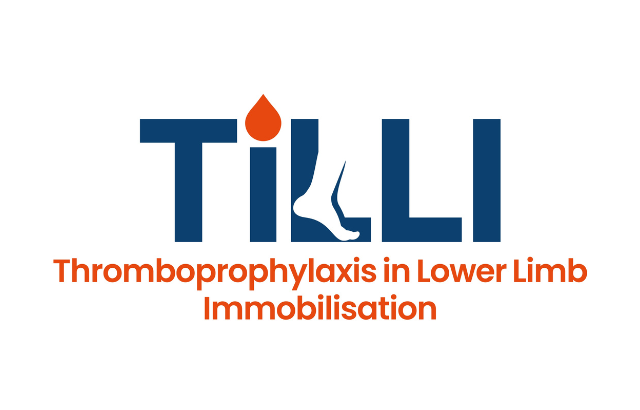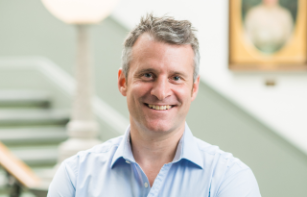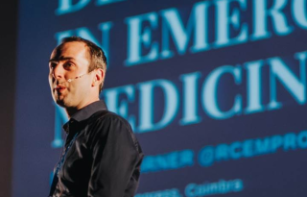Researchers secure £3m NIHR funding for new blood clot prevention trial
The research group Barts Bone & Joint Health, comprising researchers and clinicians from Queen Mary University of London, Barts Health NHS Trust, and other partner institutions has secured £3 million in funding from NIHR (National Institute for Health and Care Research) to deliver the UKs largest trial in thromboprophylaxis.

Thromboprophylaxis in Lower Limb Immobilisation (TiLLI)
The trial named Thromboprophylaxis in Lower limb Immobilisation (TiLLI) aims to compare different methods of pharmacological thromboprophylaxis – medications used to prevent blood clots – for patients with temporary lower limb immobilisation after injury to determine their clinical and cost effectiveness.
The bid is being led by Professor Xavier Griffin, Clinical Professor in Orthopaedics at Queen Mary University of London, and Honorary Consultant Orthopaedic Surgeon at Barts Health NHS Trust and Dr Daniel Horner, Consultant in Emergency and Critical Care Medicine at Salford Royal NHS Foundation Trust, in the UK.

Professor Xavier Griffin, Chair of Barts Bone & Joint Health
Approximately 70,000 people are immobilised after injury every year in the UK. This can lead to venous thromboembolism (VTE), a condition where blood clots form in the veins, and may develop into serious conditions such as deep vein thrombosis (DVT) or pulmonary embolism. Temporary lower limb immobilisation (plaster cast, walking boot or rigid splint) and injury are combined risk factors for someone developing VTE. Many people who survive VTE suffer from longer term physical or psychological complications.
Luckily, VTE in lower limb immobilisation is potentially preventable through early prophylaxis with anticoagulant medication, which helps keep blood flowing smoothly and prevent clot formation. However, the risk of VTE varies widely from person to person, and there are multiple drugs available.

Dr Daniel Horner, Consultant in Emergency and Critical Care Medicine
Currently, there is no high-quality evidence comparing different methods of pharmacological thromboprophylaxis for patients at high risk of VTE and limited evidence of the benefits and risks of any prophylaxis for patients at low risk of VTE. This trial will address this evidence gap by comparing the clinical and cost effectiveness of various anticoagulant drugs and therapies.
Professor Xavier Griffin, Chair of Barts Bone & Joint Health, said: “We are thrilled to have been awarded this grant to answer this question. It will have a huge impact on clinical care, improving care for patients not just in the UK but worldwide.”
More information
Barts Bone & Joint Health
Our mission is to improve the health and wellbeing of people with bone & joint disorders and injuries. Barts Health NHS Trust has a long and distinguished history dating back to the 12th Century and continues to grow. Barts and the London Charity funded the establishment of a new academic trauma and orthopaedic unit in August 2020. Starting something new is incredibly exciting and gives us a unique opportunity – to build a world-class team around our four core values.
Transforming how we do research is central to our mission, we need to test treatments faster and more economically so that we can accelerate improvements in clinical care. Our emphasis on developing large scale studies and collaborations in bone & joint health will allow for bigger trials completed in a shorter time frame.
More critical than any one of our studies is inspiring the next generation of clinical researchers who will keep our organisation and values at the forefront of research. Our home-grown mentoring program and initiatives to bring clinicians’ ideas to a reality will foster talent and inspire others to keep driving forward.
Faculty of Medicine and Dentistry, Queen Mary University of London
Our internationally recognised research transforms the lives of people around the world while remaining grounded in our local community. We tackle global medical problems and improve the health of millions. From the laboratory bench to public health initiatives, we’re at the forefront of innovation in medical research, finding solutions to some of the world’s greatest health challenges. Our multidisciplinary approach is fundamental to this. Many of our most successful projects are the result of collaborations between our institutes and talented researchers across Queen Mary. We capitalise on our strengths and harness knowledge and scholarships for creation and innovation in the fields of cancer, inflammation and trauma, cardiovascular diseases, and population health.